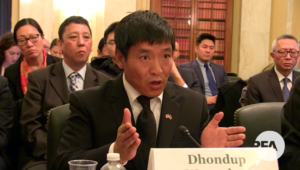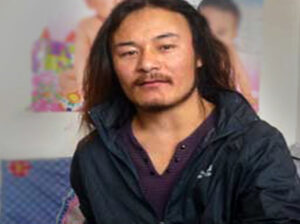
Photo: Tibet.net
Activist filmmaker and former political prisoner Dhondup Wangchen has visited Washington DC for the first time to raise awareness about the grave situation in Tibet, following his escape from the People’s Republic of China (PRC). The key purpose of his visit was to testify before the United States Congressional Commission on China, at a hearing entitled Tibet – From All Angles: Protecting Human Rights, Defending Strategic Access, and Challenging China’s Export of Censorship Globally. Chaired by Senator Marco Rubio, the hearing concerned the continuing plight of Tibetans at the hands of Chinese oppression.
Calling for a recognition that Tibetans are ‘not victims but agents of change trying to explore and use every opportunity to fight for a better future’, Wangchen asked that the United States support Tibetan human rights and deploy bolstered American diplomacy to tackle the situation. He requested that the US administration raise the issue in all appropriate fora, including the United Nations. He also endorsed recommendations to urge China to release political prisoners, including the 11th Panchen Lama, Gedhun Choekyi Nyima.
A reception was put on to honour his visit by House Democratic Leader Nancy Pelosi. Wangchen was also granted a private audience with Pelosi, where they discussed how the USA could do more to help Tibetans, especially those who were imprisoned. Recalling previous visits to Tibet and Nepal, Pelosi recounted witnessing the true plight of the Tibetan people. Relatives of Wangchen, Representative Ngodup Tsering (Office of Tibet DC) and Matteo Macacci (International Campaign for Tibet) also attended the meeting.
Wangchen was arrested by the Chinese authorities in March 2008, and charged with ‘inciting subversion’. His ‘crime’ was to have produced the widely acclaimed documentary, Leaving Fear Behind, which highlighted the political plight of the Tibetans in the lead up to the 2008 Beijing Olympics. The film was created from footage of over one hundred interviews, conducted between 2007 and 2008, across various parts of Tibet. In his address to the Congressional Commission, Wangchen explained how he had ‘recorded a never-ending stream of untold stories of past atrocities.’ Released by the Zurich-based organisation Filming for Tibet, the feature won a number of prestigious awards, including the Vaclav Havel Prize for Creative Dissent (2014) and the Committee to Protect Journalists International Press Freedom Award (2012).
Following a year’s detention at the hands of the Chinese, Wangchen was sentenced in December 2009 to six years in prison. During this period he was subjected to interrogation and torture, forced to sit in a ‘tiger chair’ (a cruel contraption which causes agonising pain), subjected to manual labour and solitary confinement, and denied food and sleep. During the hearing, he recounted how he had been told by his captors to denounce His Holiness the Dalai Lama, a request he repeatedly refused. He also contracted Hepatitis B in prison, for which he received no proper medical treatment. Wangchen’s friend and assistant, the Tibetan monk Golok Jigme, similarly suffered detention and torture. Throughout their imprisonment many international organisations, including Amnesty International and Reporters Without Borders, protested against this treatment.
Although Wangchen was officially ‘released’ in June 2014, he remained under Chinese surveillance, and was regularly phoned by the police. In his speech to the Committee, he explained that he never felt free, and, after enduring these conditions for three and a half years, his feelings of frustration and increasing isolation motivated him to leave the PRC. Wangchuk managed to escape from China to the United States in December 2017 with the help of Jamyang Tsultrim, and was reunited with his family in San Francisco, in what he has described as a ‘wonderful moment’.




 Print
Print Email
Email